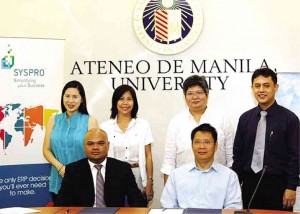Bringing the workplace into the classroom

WORK EXPERIENCE (Seated, from left) Epictech’s director of operations Francene John Alcordo and vice president for Loyola School of ADMU Dr. John Paul Vergara; (standing, from left) Epictech’s Charlene Chua and Noreen de Dios, dean Evangeline Bautista of ADMU’s School of Science and Engineering and Proceso Fernandez Jr., chair of ADMU Department of Information System and Computer Science Rima Jessamine M. Granali
Diane Chua dreams of working in a computer company someday.
With the new partnership between Ateneo de Manila University (ADMU) and Epictech Inc., the third year Bachelor of Science in Management Information Systems (MIS) student will be able to experience what it is like to do the actual work even before she gets her diploma.
The partnership between ADMU and Epictech, a business solutions provider, will expose students to workplace scenarios through an enterprise resource planning (ERP) software used by manufacturers and distributors worldwide.
Syspro, a partner of Epictech, is a software developer with an academic alliance program that helps educational institutions integrate information technology (IT) into their curricula.
Universities in South Africa, Kenya and Canada have already adopted the ERP software suite. ADMU is the first in Asia to use the system.
Ateneo will offer the ERP solution as an elective starting this school year.
“I think it will be more fun,” says Chua of learning IT concepts using ERP.
The classroom will be more like a workplace and students will be more like on-the-job trainees, says Chua, one of the students present at the signing of the three-year partnership between Epictech and ADMU.
She adds that when everything is theoretical, “you don’t really understand the point [being made].”
Advantage
Learning to manipulate the software this early will be an advantage, she says, especially if it is the one used by computer companies. Students will get a glimpse of how the industry operates.
“When we step into the real world, it will be easier for us to adjust,” she says.
Proceso Fernandez Jr., chair of ADMU Department of Information System and Computer Science, says they aim to align the skills of the students with the demands of the industry.
To help students understand concepts, “you have to do hypothetical data and play around with them,” Fernandez says. But once they get employed, graduates may be shocked by the large amount of manufacturing data they have to deal with because they have been accustomed to the small table, he adds.
“If you have real data, then you can teach them the actual process, such as how to use the tool better. How do you look for proper functions within the tool?” he says.
Several worksheets and other programs can be assembled on the Syspro dashboard. With the software, companies can monitor in real time changes in sales, inventory and other things.
If sales increase, the number of materials in the inventory will automatically decrease, Fernandez says. “No need to check each worksheet and do subtraction or addition manually.”
It will be beneficial for Ateneans in the IT field because companies need people familiar with enterprising system tools.
But simple know-how is not enough. At the end of the day, it is all about serving the needs of the company.
Paolo Agloro, the department’s associate chair, says he imagines asking students to look for real clients and convince them to adapt their proposed solutions to existing problems.
This will force students “to think creatively and come up with solutions,” Agloro says. They will also learn how to deal with clients.
Supply chain, e.Net, VBScripting, crystal reports and executive dashboards are among the processes they can learn using the Syspro ERP software.
No hassles
Unlike open-sourced software that consume a lot of time to set up, says Agloro, ERP eliminates preparation hassles and allows students to focus on analyzing the problem and figuring out solutions.
“We measure their learning based on how they find solutions, not on setting up [the system],” Agloro says.
The self-confessed geek notes that students often get stuck in the setup stage and are unable to proceed to problem analysis where real learning occurs.
He expects his students to do more with the software, especially with the customization feature. “If they could do only one thing before, now they can do four and come up with better solutions…. It’s a smarter way of working.”
With tech-savvy undergraduate students, the professor says it will be easy to introduce the software.
“Any new technology they’ll eat up like crazy,” he says, adding that his students are usually quick to adopt technology, finding it corny “when it becomes mainstream.” They look for innovations, Agloro says.
“What’s good about this software is they can build on [it],” he adds.
Epictech’s director of operations Francene John Alcordo believes one cannot go wrong investing in the youth and their education.
Although many companies in the country have already shifted from “archaic” processes to enterprising system tools, he notes that, based on experience, some workers are resistant to change.
“They are fearful of the beast. They worry that they might get into trouble or lose their jobs,” he says.
Teaching ERP to university students eases the transition. Exposing them to what lies ahead lessens the fear, he says.














